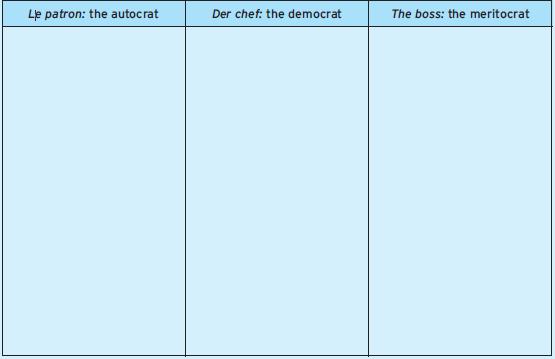Enter key examples in the table below of behaviour or attitudes that reflect the label given to
Question:
Enter key examples in the table below of behaviour or attitudes that reflect the label given to each type of leader at the beginning of the article.
 Le patron, der Chef and the boss By Alison Maitland Have you heard the one about the three captains of industry? The Brit insists he is happy to have his decisions challenged. The German stresses the importance of humility. And the Frenchman enjoys wielding power without having to consult first.
Le patron, der Chef and the boss By Alison Maitland Have you heard the one about the three captains of industry? The Brit insists he is happy to have his decisions challenged. The German stresses the importance of humility. And the Frenchman enjoys wielding power without having to consult first.
Far from being a joke, these are the revealing findings of a new survey of 200 chief executives, chairmen and directors in the UK, Germany and France. It is often assumed that rules about leadership apply regardless of culture or nationality. But the survey suggests this is an over-simplification. It highlights big differences in national attitudes to responsibility, status and decision-making that global companies would do well to understand.
The research, co-ordinated by MORI for DDI, an international human resources consultancy, labels French captains of industry as ‘autocrats’, Germans as ‘democrats’ and British as ‘meritocrats’.
In support of these catchy generalizations, it finds that fewer than three in 10 French bosses are happy to be challenged about the decisions they make, compared with half of Germans and more than nine out of 10 business leaders in the UK. The French prize the autonomy they gain from the job. Nearly two-thirds count ‘the freedom to make decisions with minimum interference’ as one of the three best things about being a leader.
‘I enjoy the decision-making without having to confer with others,’ says one Gallic captain of industry.
Only 46 per cent of bosses in Germany and 39 per cent in the UK regard this as being important.
The ability to hand-pick their team is another perk of the job for the French, but one that is less highly rated in Germany and Britain.
For business leaders in the UK and Germany, the best thing about the job is developing talent in the company. Seventy per cent of British bosses and nearly 50 per cent of Germans – but only 14 per cent of French ones – rate this among the top three benefits of leadership.
Although few of the 200 captains of industry choose ‘being in a position of power’ as one of the three best things about the job, the French are three times more likely than the British, and eight times more likely than the Germans, to regard this as important, the survey finds.
‘In Germany, you accept the responsibility of authority but you don’t talk about it, whereas typically in France, if you belong to the upper echelons of management, or if you own a company, it’s a badge of success that you wear in every aspect of your life,’ says Steve Newhall, managing director of DDI Europe
Step by Step Answer:

Understanding Cross Cultural Management
ISBN: 9780273732952
2nd Edition
Authors: Marie Joelle Browaeys, Roger Price





